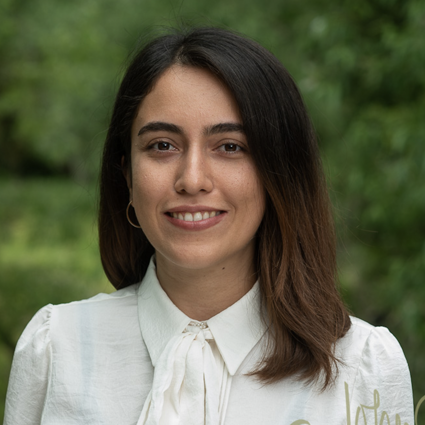Career Case Study - Dr Elnaz Azizi, Department of Engineering Science, University of Oxford
Researcher Career Case Study

Dr Elnaz Azizi
From Postdoctoral Research Associate to Research Fellow
Elnaz joined the Department’s Energy and Power Group in 2021 as a Postdoctoral Research Associate. She is now an Eric and Wendy Schmidt AI in Science Research Fellow.
Elnaz joined the Department’s Energy and Power Group in 2021 after completing a PhD in electrical engineering at the Tarbiat Modares University in Tehran. In her first year as a PDRA, she worked within Project LEO, one of three smart local energy system demonstrator projects in the UK which sought to progress the local energy system by replicating the electricity system of the future in Oxfordshire. Her role within the project is to focus on using University and County buildings as energy assets through data analysis and system modelling.
With an interest and experience in machine learning (ML), Elnaz then started volunteering to use her ML skills in other projects within the Department. Although she was undecided whether to stay in academia or move to industry, she was interested in the possibility of transitioning to being an Oxford Research Fellow, which would give her more career opportunities and stability (as well as fewer visa extension applications!) – in addition to funding her own research. “I spoke to my PI and to senior Postdoctoral Research Associates (PDRAs) in the EPG about it. They were super helpful. I realised I needed an idea to create a proposal for a Fellowship, and I came up with the idea of solving real-world problems in the power system using ML-based methods”.
"I realised I needed an idea to create a proposal for a Fellowship, and I came up with the idea of solving real-world problems in the power system using ML-based methods”
After doing some research on different Fellowships and asking her colleagues for recommendations on which ones to apply for, Elnaz realised her proposed area of study was an ideal combination for the Eric and Wendy Schmidt AI in Science Fellowship Programme, which drives innovate use of AI in STEM research. In researching Fellowships, Elnaz looked not just at the research area and criteria, but also at how long the Fellowships were for, whether they provided training and support, and if networking opportunities would be available.
"I asked my colleagues for feedback on my draft to make sure it had as much chance as possible at being successful.”
Before submitting her Fellowship application, Elnaz read previous EPG Research Fellow’s proposals. “I knew how to write papers, but not proposals – it’s a very different style. It needed to be framed in a way so the reviewers could see how Fellowship criteria were being met by my proposed research. I asked my colleagues for feedback on my draft to make sure it had as much chance as possible at being successful.”
Her proposal was accepted, and Elnaz is enthusiastic about recommending Fellowships to other researchers. “You get the opportunity to develop grant writing skills to secure funding for your research, learn to project manage, gain experience supervising students and benefit from evaluation by your supervisor”, she says.
“You get the opportunity to develop grant writing skills to secure funding for your research, learn to project manage, gain experience supervising students and benefit from evaluation by your supervisor”
With her own research well under way, she applied for an extension to her Fellowship for a further year. Although Elnaz is still not sure whether she wants to remain in academia or eventually move to industry, the Fellowship gives her some breathing space while she figures that out.
Fellowship Research
Elnaz's research interests lie at the intersection of machine learning and power systems, with particular attention to load monitoring for demand flexibility in the context of zero-carbon energy systems. As an AI in Science Fellow, she is working on the application of machine learning in translating the data to actionable information in the substation level which is funded by Schmidt Futures. During her postdoc, she contributed to Future System Planning within the Innovate UK demonstrator Local Energy Oxfordshire project to support the distribution grid in achieving the net-zero goal. In collaboration with the social aggregator Low Carbon Hub, she worked on the design of learning-based algorithms for forecasting power generation in hydro power stations. Her engagement and interaction with domain experts led her to appreciate the need for data-driven algorithms that reach beyond traditional power grid optimisation and encompass economic and social factors.
